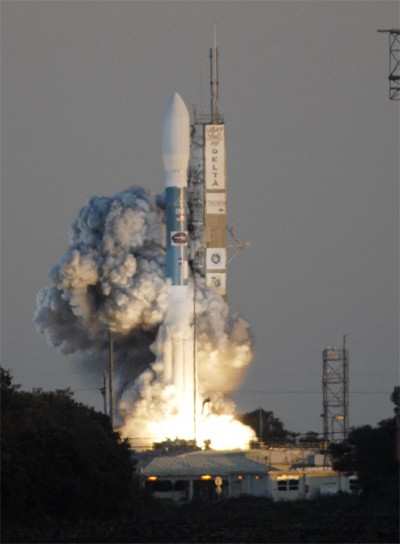Sun, Feb 18, 2007
Aurora Observation Project Underway
Five satellites... one rocket. Just past 6 pm EST Saturday,
NASA's THEMIS mission blasted off from Cape Canaveral Air Force
Station in Florida, racing into space on the flaming power of three
rocket stages and nine solid rocket motor.

Once in proper orbit, the five small satellites comprising the
Time History of Events and Macroscale Interactions during Substorms
(THEMIS) project will disperse around Earth to monitor auroras like
the Northern Lights.
NASA is undertaking the mission to investigate what causes
auroras in the Earth's atmosphere to change in appearance and
dissipate. Discovering why the light of auroras can fluctuate and
fade will provide scientists with important details on how the
planet's protective magnetosphere works and on the sun-Earth
connection.
As Aero-News reported, NASA
originally bumped the launch date to Friday, due to concerns at
Kennedy Space Center about an advancing cold front and the severe
storms accompanying it. The storms remained in the area throughout
Friday, causing stronger-than-acceptable upper-level winds and
resulting in a second 24-hour delay.
Named for the Greek goddess of justice, wisdom and good counsel,
and the guardian of oaths, THEMIS is a mission to investigate what
causes auroras in the Earth's atmosphere to dramatically change
from slowly shimmering waves of light to wildly shifting streaks of
color.
"The THEMIS mission will make a breakthrough in our
understanding of how Earth's magnetosphere stores and releases
energy from the sun and also will demonstrate the tremendous
potential that constellation missions have for space exploration,"
said Vassilis Angelopoulos, THEMIS principal investigator at the
University of California, Berkeley. "THEMIS' unique alignments also
will answer how the sun-Earth interaction is affected by Earth's
bow shock, and how 'killer electrons' at Earth's radiation belts
are accelerated."
NASA states discovering what causes auroras to change will
provide scientists with important details on how the planet's
magnetosphere works and the important Sun-Earth connection.
(Photo courtesy NASA)
More News
From 2023 (YouTube Edition): "Ain’t Your Daddy’s Super Cub”—Don Wade Co-owned by Don and Ron Wade—the former of Don’s Dream Machines, a storied >[...]
Pilot-Rated Passenger Reported That The Pilot Did Not Adequately “Round Out” The Landing Flare And The Airplane Bounced And Yawed To The Right Analysis: The pilot state>[...]
Dead Reckoning Dead reckoning, as applied to flying, is the navigation of an airplane solely by means of computations based on airspeed, course, heading, wind direction, and speed,>[...]
Aero Linx: Lake Amphibian Club This website is created and sponsored by the Lake Amphibian Club, to help spread the word about these wonderful, versatile amphibians that can land j>[...]
“I am deeply honored to be sworn in as NASA administrator. NASA’s mission is as imperative and urgent as ever — to push the boundaries of human exploration, ignit>[...]
 Classic Aero-TV: In Praise of Alabamas Patriot Aircraft USA
Classic Aero-TV: In Praise of Alabamas Patriot Aircraft USA NTSB Final Report: Cirrus Design Corp SR22
NTSB Final Report: Cirrus Design Corp SR22 ANN's Daily Aero-Term (12.21.25): Dead Reckoning
ANN's Daily Aero-Term (12.21.25): Dead Reckoning ANN's Daily Aero-Linx (12.21.25)
ANN's Daily Aero-Linx (12.21.25) Aero-News: Quote of the Day (12.21.25)
Aero-News: Quote of the Day (12.21.25)



